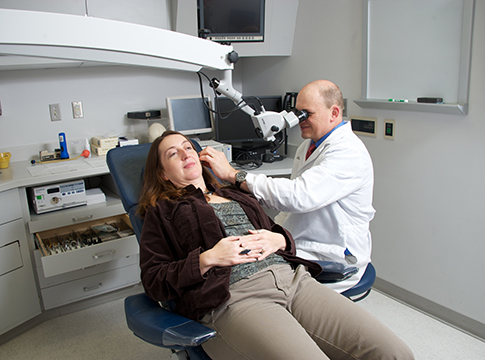Latest Trends in Otolaryngology: What Patients Should Know
Wiki Article
Checking out the Field of Otolaryngology: What to Anticipate When You Speak With an ENT
Otolaryngology, generally referred to as ENT, includes the medical diagnosis and treatment of nose, throat, and ear conditions. ENT surgery. For those experiencing relevant concerns, speaking with an ENT specialist can give quality and relief. Recognizing what to anticipate during such examinations is necessary for reliable communication and care. This review will certainly detail essential facets of the ENT experience, including common factors for gos to and the procedures associated with diagnosis and therapyComprehending Otolaryngology: A Summary
Otolaryngology, frequently referred to as ENT (Throat, nose, and ear) medication, is a customized branch of medicine that concentrates on the medical diagnosis and treatment of conditions impacting these essential areas of the body. This area includes a wide variety of problems, consisting of those associated to hearing, equilibrium, respiratory function, and speech. Otolaryngologists are educated to manage both surgical and clinical treatments, utilizing sophisticated methods and technologies. Their expertise prolongs beyond typical ailments, addressing problems such as allergic reactions, sinus infections, and hearing loss. In addition, they play an important duty in the management of head and neck cancers, supplying comprehensive treatment customized to private client requirements. On the whole, otolaryngology remains vital for maintaining health and lifestyle in afflicted people.Common Reasons to See an ENT Professional
Many people seek the knowledge of an ENT expert for a variety of reasons, showing the varied nature of conditions that impact the nose, ear, and throat. Typical concerns consist of persistent sinusitis, which commonly causes relentless nasal congestion and facial pain. Allergies and their linked symptoms, such as itching and sneezing, also motivate sees to these experts. Hearing loss, whether unexpected or gradual, is another considerable reason for appointment. In addition, people may seek assessment for throat conditions, including persistent hoarseness or ingesting troubles. Rest apnea, identified by disturbed breathing during sleep, is often addressed by ENT professionals also. Each of these problems highlights the value of specialized care in handling intricate ENT-related health concerns.Getting ready for Your ENT Appointment
When preparing for an ENT appointment, it is important to gather appropriate information and consider any type of specific worries. Patients must put together an in-depth case history, including previous ear, nose, or throat problems, surgical procedures, and current medicines. Recording signs-- such as duration, frequency, and seriousness-- can provide beneficial insights for the ENT expert. In addition, individuals need to prepare a checklist of questions they wish to ask, making sure that all worries are attended to throughout the see. Bringing along any appropriate clinical records or test results can better aid the ENT in recognizing the person's problem. Lastly, clients need to verify their visit information, including place, time, and day, to lessen any final complication. Proper preparation can enhance the effectiveness of the consultation and lead to better outcomes.
What to Expect Throughout the Assessment
As the appointment begins, the patient can expect to involve in a comprehensive conversation with the ENT professional about their signs and symptoms and case history. The professional will certainly ask about the duration, regularity, and intensity of signs and symptoms such as hearing loss, nasal blockage, or sore throat. Furthermore, the person's previous medical problems, drugs, and any kind of pertinent family background will be examined, assisting the professional in creating a total understanding of the individual's health. The ENT may additionally ask about way of living factors, such as exposure to irritants or irritants. This open discussion develops a foundation for the examination, guaranteeing that the patient's concerns are dealt with and setting the stage for any type of needed assessments or recommendations for therapy.Analysis Tests and Treatments in Otolaryngology
An array of diagnostic examinations and treatments are essential in otolaryngology to properly review and identify problems affecting the throat, nose, and ear. Typical tests consist of audiometry, which determines hearing feature, and tympanometry, evaluating center ear stress. Nasal endoscopy allows visualization of the nasal flows and sinuses, while laryngoscopy takes a look at the throat and vocal cords. Imaging methods, such as CT scans and MRIs, give comprehensive sights of head and neck structures. Allergic reaction testing may also be performed to recognize triggers for sinus or respiratory system issues. These diagnostic devices enable ENT professionals to develop an extensive understanding of patients' problems, making certain customized and efficient administration plans. Correct diagnosis is important for effective therapy outcomes in otolaryngology.Therapy Alternatives Provided by ENT Specialists
ENT specialists supply a variety of treatment options tailored to address specific conditions impacting the ear, throat, and nose. These therapies range from conventional methods, such as medicine and way of life modifications, to even more intrusive treatments. Allergic reactions may be handled with antihistamines or immunotherapy, while chronic sinus problems may require nasal corticosteroids or sinus surgical procedure. For hearing loss, ENT professionals commonly suggest listening device or medical interventions like cochlear implants. In cases of throat disorders, choices can include speech therapy or medical website procedures to remove blockages. Furthermore, they may provide advice for managing rest apnea, consisting of making use of CPAP tools or surgical treatments. In general, the goal is to improve patients' high quality of life through personalized care and reliable treatment techniques.When to Look For Follow-Up Care With an ENT
When to seek follow-up treatment with an ENT expert is essential for handling recurring symptoms or complications connected to ear, throat, and nose problems, identifying. Clients need to think about setting up a follow-up visit if signs and symptoms continue despite initial treatment, such as chronic ear discomfort, nasal congestion, or throat discomfort. Adjustments in hearing, balance problems, or unusual nasal discharge may likewise require additional analysis. Furthermore, if a person experiences side effects from recommended medicines or has actually undertaken a procedure, follow-up care is vital to monitor recovery and deal with any type of concerns. Prompt assessments can ensure efficient administration of problems, protect against potential issues, and offer satisfaction relating to one's health and wellness. Seeking follow-up care promotes aggressive wellness administration in otolaryngologyFrequently Asked Questions
What Credentials Should I Seek in an ENT Specialist?
When seeking an ENT specialist, one must try to find board qualification, relevant experience, and strong client reviews. In addition, reliable communication skills and a caring strategy can significantly improve the general therapy experience.How Do I Choose the Right ENT for My Needs?
Choosing the right ENT expert entails assessing their credentials, experience, and individual testimonials. It is important to ponder their communication style and method to treatment, guaranteeing they line up with the person's details health and wellness needs and choices.Are There Any Dangers Connected With ENT Procedures?
The risks related to ENT procedures might include infection, blood loss, anesthetic difficulties, and potential damage to surrounding structures. Patients should discuss these threats with their physician to comprehend private concerns and assurance informed decisions.Just How Can I Manage Anxiousness Prior To My ENT Appointment?
To take care of stress and anxiety prior to a consultation, individuals can exercise deep breathing workouts, visualize positive end results, prepare questions ahead of time, and look for support from buddies or household, promoting a feeling of peace of mind and peace.
What Should I Do if I Experience Negative Effects From Treatment?
The person needs to without delay report them to their medical care provider if side results from treatment take place. Modifications to therapy or extra treatments might be needed to ensure safety and performance in handling their condition. As the examination begins, the patient can expect to involve in a thorough conversation with the ENT expert about their signs and symptoms and clinical background. These diagnostic devices enable ENT specialists to establish a detailed understanding of patients' problems, making certain customized and reliable monitoring strategies. ENT specialists provide a variety of therapy options customized to deal with details problems influencing the ear, nose, and throat. When looking for an ENT expert, one must look for board certification, relevant experience, and strong client reviews. Picking the ideal ENT professional includes examining their certifications, experience, and patient evaluationsReport this wiki page